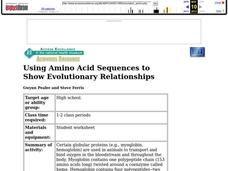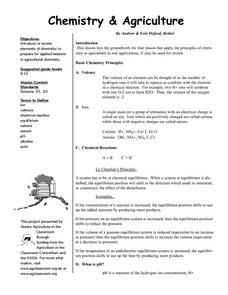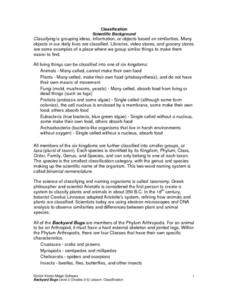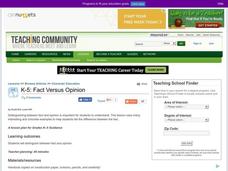Curated OER
Investigating an Enzyme-controlled Reaction: Catalase and Hydrogen Peroxide Concentration
Are you looking for a way to measure cellular respiration? Try it with pureed potatoes. With some standard high school science equipment, biologists can perform an investigation and collect data surrounding byproducts of respiration. You...
Curated OER
The Human Impact on the Environment
Despite the typos and formatting issues, the Word document found here has some great potential. There are two questions that ask learners to put several events in a logical order; these could easily be made into a card sort activity....
University City High School
Metabolism Lesson Plan
Not a lesson in the traditional sense, this is a collection of resources with which you can craft a lesson on metabolic processes. It includes an outline of topics, some brief discussion, and a large array of animations, images, and...
Curated OER
Using Amino Acid Sequences to Show Evolutionary Relationships
Compare protein fragments, count amino acids, and use the information to explore common ancestry. The resource mentions a student worksheet, however, a separate printable worksheet is not provided. The exercises are written into the...
Curated OER
Baby Shamu Suit
Students name and describe the functions of the whale body parts. They create killer whale suits out of paper grocery bags, and role-play whale behavior.
Curated OER
Spaceship Earth
Students study the earth as a system, and the fragility of that system when population, and pollution, are considered as interactive parts of earth.
Curated OER
Crashed on the Moon
Students compare and contrast the environments of the moon and the earth. They discover how the differences might change one's daily activities.
Curated OER
What Happens to the Food You Eat? The Digestive System
Students observe a video displaying body parts and functions of the digestive system. They make drawings of the digestive system from their observations. They act out a short play involving body parts.
Curated OER
Basic Chemistry Principles
High schoolers use the basic principles of Chemistry to determine pH levels. Elements of the Periodic Table are also included in this lesson.
Curated OER
Survival: The Human Body in Extreme Environments
Students create a list of signs the human body gives during threatening weather conditions. They investigate the causes and conditions of dehydration, overheating, and hypothermia.
Curated OER
Beef and Beef By-Products
Learners examine the various types of beef and the many uses of its by-products. They increase their knowledge by playing a game of "beef bingo."They discuss what parts of beef animals are their by-products.
Curated OER
Renewable vs. Non-Renewable Resources
Here's a fine lesson on renewable and non-renewable sources of energy for your 5th graders. In it, learners list a number of natural resources on the board, then try to sort the resources into appropriate categories. This helps them to...
Curated OER
Nature and Fitness Trail
Students plan stations for a nature and fitness trail and construct an accompanying e-Book for extended descriptions at each station. Data on the human impact on the environment is gathered in this activity.
Curated OER
Graphing Iron Data
Students apply a data set to create a graph show how iron ore impacts an ecosystem. They explain how the iron effects the distribution and abundance of phytoplankton in coastal ecosystems using spreadsheet software.
Curated OER
Week 3: Pollution Source and Effects
Lab groups set up an experiment to observe what happens over time in collected pond water when fertilizer, representing pollution, is added. This website does not include student lab sheets, but background information, materials, and...
Curated OER
Using Amino Acid Sequences to Show Evolutionary Relationships
Junior biologists compare the amino acid sequences from fragments of five different globin molecules. They count the letter differences between each species pair. They construct a graphic representation of the evolutionary relationships...
Curated OER
Fish Anatomy
Add a handy reference sheet about fish anatomy and functioning to your learners' biology or animal notebooks. Though this resource doesn't provide any practice, it makes a useful addition to any study of anatomy, biology, species, fish,...
Curated OER
Go To The Head of the Cloud
Students pretend they are water droplets traveling through the water cycle. Using their text, they discover the steps in the cycle and the different paths water can take. They write a report about their journey through the water cycle...
Curated OER
Primary PE Lesson
Students divide into two groups facing each other; tossing the bean bags to each other. The teacher calls out names of unhealthy food and students start to throw beanbags back and forth to their partner. When students hear a healthy...
Curated OER
Backyard Bugs
Explore the concept of scientific classification and the similarities and differences between plant and animal species. Your class will participate in hands-on activities by investigating dichotomous keys and classifying their shoes. To...
Curated OER
Periodic Table of the Elements
First graders discuss, at their level, the concept of elements making up all matter. They discover the story of Dimitri Mendeleev and his discovery of the Periodic Table of the Elements. They locate and color some of the most common...
Michigan Sea Grant
What's in This Water?
Pupils investigate the biological and chemical characteristics of water to determine where purple loosestrife occurs. They create data sheets to record water quality tests in several locations and work in groups to conduct the water...
Curated OER
9th Grade
Ninth graders discuss the principal source of energy entering the marine ecosystem. They name some of the autotrophs at the Maui Ocean Center. Students name some of the heterotrophs at Maui Ocean Center. They are taught that plants are...
Curated OER
Fact Versus Opinion
Learners differentiate between fact and opinion. They define fact and opinion, then listen to and identify examples of each. Students identify different books where facts and opinions can be found, and cut out newspaper and magazine...
Other popular searches
- Carbon Dioxide Oxygen Cycle
- Dissolved Oxygen
- Oxygen and the Human Body
- Oxygen Cycle
- Oxygen and Carbon Dioxide
- Carbon Oxygen Cycle
- Oxygen Carbon Dioxide
- Oxygen Cycle Diagram
- Solubility Oxygen
- Mount Everest Without Oxygen
- Plants and Oxygen
- Transporting Oxygen, Glucose

























